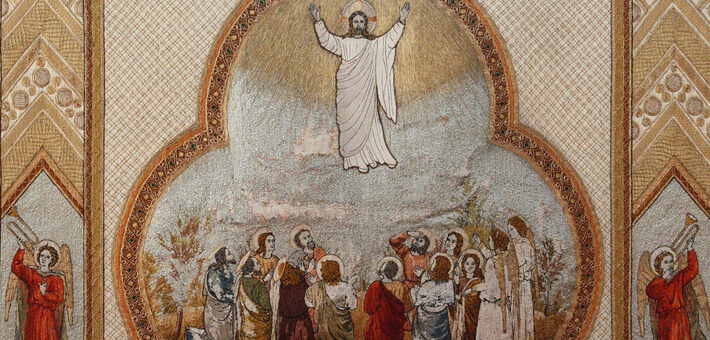Commentary on Luke 24:44-53
Many believers think of Jesus’ ascension like an excuse for Jesus’ absence: because he ascended, Jesus is gone.
Many believers think of Jesus’ ascension like an excuse for Jesus’ absence: because he ascended, Jesus is gone. And although the idea applies simply to Jesus’ physical body, it tends to be associated with broader implications about the divine presence: since Jesus “ascended into heaven,” we on earth remain “left behind.” Bummer.
But this idea does not hold water well in Luke-Acts. First, in Acts 1:1 Luke describes his “first book” as entailing “all the things that Jesus began to do and to teach” (my translation: erxato ho Iesous poiein te kai didaskein). The implication is Jesus has not finished as Luke’s second volume begins. Second, Acts shows a Jesus still engaged with the world by healing (“Aeneas, Jesus Christ heals you,” 9:34), associating with Christ-followers (9:4; 22:7; 26:14), and acting through those who act in his name (3:6, 16; 4:10, 30; 16:18). Certainly, the post-ascension Jesus “acts” in ways much less hands-on, but scattered instances in Acts show a story at odds with a simplified concept of “once Jesus was here, now he’s not.”
What the ascension of Jesus in Luke-Acts signifies has far less to do with geography (Where Jesus is) than with his exaltation (Who Jesus is). Jesus’ ascension firmly establishes him as the Lord and Messiah, exalted at God’s right hand in ways not merely physical (Acts 2:22-36; 3:26; 5:31; 10:40; 13:31-38; cf. 3:21). In short, the ascension of Jesus speaks volumes about who Jesus is, without confining him to house arrest until he returns again.
Luke 24:44-53
Today’s Gospel reading takes place the evening of Resurrection Sunday, among an unspecified number of followers (Luke 24:13, 33). At seeing the resurrected Jesus, they shift from terror (v. 38) to “disbelieving and still wondering” (v. 41). And despite various proofs, their “wonderings” do not seem to dissipate drastically (vv. 38-40, 42-43).
Our Gospel reading may be divided into three movements, each with a distinctive theme.
I. The past: The necessity of these things (vv. 44-47)
In the first movement, Jesus reviews the critical events of Luke’s Gospel and deems them necessary fulfillments of scripture. First, he recalls what he earlier taught, that “everything written about me in the law of Moses, the prophets, and the psalms must be fulfilled” (v. 44). This tripartite description (‘the law of Moses, the prophets, and the psalms’) largely squares with the nascent sense of what constituted Israel’s scriptures at this time.1 Even more, the language of necessity (“must,” dei) is a trait of Luke’s writings, signifying matters that “must” take place for God’s greater purposes.2 Second, Jesus “opened their minds to understand the scriptures” (v. 45). The next verse further specifies this enlightenment:
“Thus it is written, that the Messiah is to suffer and to rise from the dead on the third day, and that repentance and forgiveness of sins is to be proclaimed in his name to all nations” (vv. 46-47).
These verses constitute a Reader’s Digest version of how Luke’s Jesus interprets his death, resurrection, and their significance: as the fulfillment of scripture. In these ways, Luke 24:44-47 recalls the highlights of Luke’s Gospel and deems them necessary acts of God’s purposes.
II. The promise: The call to be witnesses (vv. 48-49)
But Luke’s Jesus does not dwell simply on the past. He turns the focus next to his followers: “you are witnesses of these things” (v. 48). Although the language of “witness” may imply merely their experiences as eyewitness, readers familiar with Acts know that being Jesus’ “witnesses” will not be merely a spectator sport. In Acts “witness” is language for the comprehensive call to testify about Jesus to “the end of the earth” (Acts 1:8; 2:32; 3:15; 5:32; 10:39; 13:31; 22:15, 20; 26:16).
Even more, in Luke 24:49 Jesus pledges “what my Father promised,” which will allow them to be “clothed with power from on high.” Though these words alone are unclear, elsewhere Luke’s writings imply that Jesus here envisions the coming of the Spirit (Luke 11:13; 12:11-12; Acts 1:4-8), who will enable the apostles to bear witness effectively (Luke 4:18-19; 12:11-12; Acts 4:31). The upshot of this promise is the capacity to be Jesus’ witnesses in every way that it is called for
III. “While You Wait”: The call in the meantime (vv. 50-53)
The final movement of our text features the main event of the liturgical day: Jesus’ Ascension. Unique to this version of the event is the prominence of “blessing.” First, while Jesus ascends he blesses his followers, a point doubly emphasized (vv. 50, 51). Second, after worshiping and returning to Jerusalem, his followers are “continually in the temple blessing God” (v. 53), causing Luke’s Gospel to both begin and end with prayer and worship at Israel’s chief sanctuary (1:10; 24:53). In fact, the phrase “blessing God” (eulogountes ton theon) is the Third Gospel’s final word in more ways than one. This colorful “blessing” and worship language (vv. 50-51, 53) gives the narrative ending an atmosphere of worship and mutual blessing, which constitutes the closing word of Luke’s Gospel.
How the Third Gospel ends implies how Jesus’ followers are to live: worshiping God, waiting on Jesus’ promises, and doing so “with great joy” (v. 52). Although today’s New Testament reading (Acts 1:1-11) points out that Jesus’ followers will not long remain in Jerusalem (1:8), it also redirects them from idleness to faithful waiting: “why do you stand looking up toward heaven? This Jesus … will come in the same way as you saw him go” (v. 11). Together, Luke 24:50-53 and Acts 1:9-11 offer a model for waiting on God that is rooted in hope, experienced with joy, and lived out by worship.
Notes:
1 But the third category (“the psalms”) is typically “the writings” (cf. Sirach’s prologue, 4QMMT 95).
2 See, for example, Luke 2:49; 4:43; 9:22; 13:14, 33; 17:25; 21:9; 22:37; 24:7, 26; also Acts 3:21; 4:12; 19:21; 23:11.


May 14, 2015